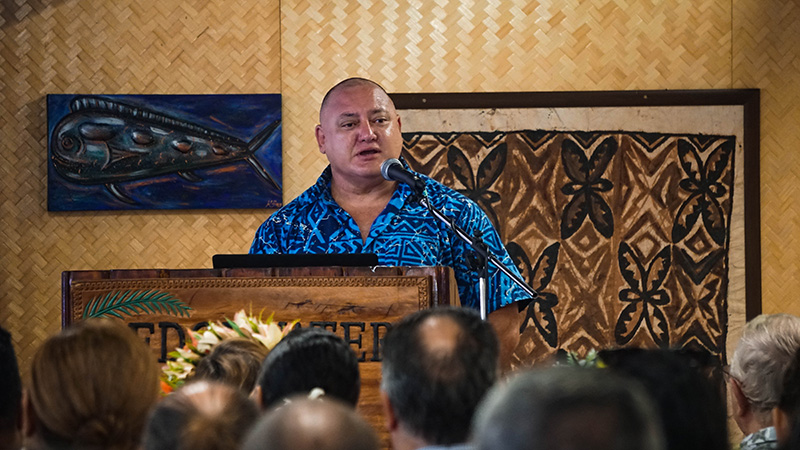Financial Secretary responds to Crocombe
Saturday 30 April 2022 | Written by Supplied | Published in Opinion

Financial secretary Garth Henderson. (PHOTO: COOK ISLANDS TOURISM). 21032304
Financial Secretary, Garth Henderson has responded to comments made by prominent businessman Tata Crocombe, who questioned the integrity of the Asian Development Bank (ADB) 2022 Asian Development Outlook which revealed the extent of economic downfall in the Cook Islands due to the Covid-19 pandemic.
Kia Orana Editor,
I respond to your article in the Tuesday paper, 26th April entitled ‘This is a debt weight that will be strangling the Cook Islands economy for the next decade’ In this article Mr Crocombe make comments that are wildly inaccurate and are likely to cause unnecessary misunderstandings that need to be corrected.
The Ministry of Finance and Economic Management (MFEM) embraces transparency and ensures we meet our legislative reporting requirement including regular economic and fiscal updates 6 monthly.
GDP data to June 2021 is publicly available on the MFEM website and has been since December last year. This data estimates the fall in GDP as much smaller than the 29.1 per cent estimated by the ADB as well. I gather from Mr Crocombe’ s comments that he has some issues with the GDP data used by both the Asian Development Bank (ADB) and the Ministry of Finance and Economic Management (MFEM) and the direct and indirect contribution of tourism related activities to GDP. This is not a suitable avenue to respond however as it is a long story, however, I am confident that both institutions give more time and effort to ensure the veracity of GDP data used than any individual of the general public would be inclined to give.
Government debt estimates are similarly published twice per year (in the Budget and Half Year Economic and Fiscal Update (HYEFU)) and are readily available on the MFEM website.
The latest HYEFU, from December 2021, shows that the debt net of the Loan Repayment Fund held by government is around $215m, and increased from around $96m prior to COVID. There is also data on the debt held at banks in the Cook Islands, which was estimated in June 2021 at around $270m – combining these numbers results in an amount far below the gross exaggeration of $1bn quoted by Mr Crocombe.
Most importantly and a matter Mr Crocombe has great issues with, the debt taken on through COVID has enabled government to support our economy and our people. Without this, measures such as the Wage Subsidy, Business Grants, Interest Relief and many others would have been forced to end much earlier – increasing the risk of scarring in the economy and making it more difficult for recovery, and likely leading to even more of our working age population migrating to New Zealand to make ends meet.
Government continues to negotiate with our major creditor, the Asian Development Bank (ADB) and other development partners, to manage debt at sustainable levels and to address debt repayment challenges. Updated information on debt will be published as part of the forthcoming budget and in view of public interest, we are likely to do more public media on our debt management strategy.
In government we welcome the conversation and the critique of the public eye, however the conversation would be more beneficial if it were informed by some readily available facts
I urge the general public to review the information we publish online, and if you have any concerns about the credibility or integrity of the Asian Development Bank (ADB), please get in touch with the ADB Senior Country Officer in their office in Nikao. ADB is a large creditable multilateral development Bank with an annual turnover of about US$28.0 B. It is the largest sovereign creditor in the Pacific Islands region and unlikely to have any interest in putting together a ‘PR’ piece for one of its smallest member countries.
Garth Henderson
Financial Secretary












































